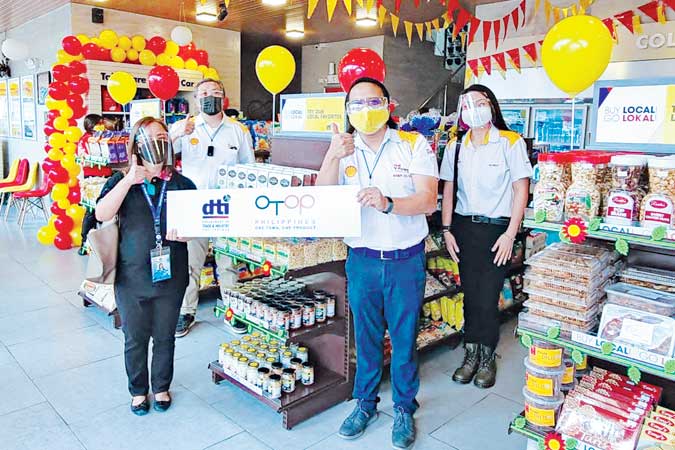
Talk Box
By Kap Maceda Aguila

FOR SOME time now, Pilipinas Shell Petroleum Corp. has publicly shrugged off the moniker “gas company” or “energy firm” in its communications, preferring to call itself a “mobility company.” This is far from a semantic prerogative; this catch-all term more accurately reflects the breadth of the company’s activities — including, one may add, its corporate social responsibility (CSR) projects.
You could say that Shell rightfully takes terms and labels very seriously because some have, through the years, become downright dated, and even onerous. So, it was important for the company to drive home the point that its new Marilao, Bulacan facility was not “just” a gas station.
Rather, this “mobility station,” boasts “improved features for mobility, sustainable innovations, local enterprises, and customer-centricity at the core of its agenda.” Said Pilipinas Shell President and Chief Executive Officer Cesar Romero, “The pandemic demonstrated just how important mobility is in our daily lives. It kept some jobs and businesses afloat during a volatile period by expanding in new and innovative ways.”
He added during the station’s inauguration, which was streamed online, “Gone are the days of dirty and dingy gas stations. Instead of getting out of there as quickly as you can, you can stay as long as you want because the experience is good.”
In a real way, Shell Marilao encapsulates the company’s avowed emphasis on environmental sustainability, and Pilipinas Shell said it is taking on the fundamental role in shaping the mobility future of the country through the recalibration of its stations and evolution of its retail business model. The new model delivers “improved features for mobility, sustainable innovations, local enterprises, and customer-centricity at the core of its agenda.”
Joined Pilipinas Shell Vice-President and General Manager for Mobility Randy del Valle, “We’re evolving to serve not only those who drive vehicles but even those who walk or ride a bike. We are here for you.” Shell can even deliver products from its Select stores via Grab or Food Panda.
An important component of Shell Marilao is livelihood. Every time the company builds a station, it adds more or less 20 jobs, but because of the retail component, that number can be doubled — good news that gets more amplified during the time of the pandemic.
Shell Marilao is a veritable one-stop destination where “customers can get fuel-based products as well as vehicle maintenance checks through the Shell Helix Oil Change+ and car wash facilities. To address the growing community of motorcyclists, the Shell Marilao mobility station also offers motorcycle care and free helmet and motorcycle seat cleaning through the Shell Advance Moto Care Express. Customers can also get essential items like food supplies through Shell Select and deli2Go, as well as from local locators like Chatime and Fariñas that offer various food choices.”
The change is stark, as mobility stations are not just the place to go when the gas tank needle approaches “E.” Shell is systematically changing the formula by rolling out “leisure and lifestyle destinations catering not only to motorists, but also tapping larger market segments with varying interests and needs like tourists and business travelers.”
Shell Marilao reflects this kind of paradigm where local flavors (sometimes quite literally) are adopted. People who drop by the Shell Select Station “will find that, aside from the aforementioned food and beverage brands, they can also buy some of the best products and goods that Bulacan can offer including turmeric tea, chicharon, mushroom chips, condiments, and processed meat.”
Pilipinas Shell Non-Fuel Retail Manager Rolyn Tomarong affirmed the role that the Shell Marilao Mobility Station plays in the larger entrepreneurial ecosystem, saying, “We do not exist within the confines of this site alone, but exist as part of a wider community. This is an exciting opportunity to use the Shell Select platform to serve more people and provide livelihood to the community. Some of the non-food products from Bulacan that we promote are native fans and bags, home furnishings, handicrafts and jewelry.”
Select today is a refined product of a hit-and-miss process. “(It) was a complete failure before because Shell wanted 80% to 90% of the products as standard. We ended up moving products and selections irrelevant to the community. It was 85% uniform and 15% discretion,” shared Mr. Romero. That formula has been turned on its head: 15% uniform and 85% discretion. This affords not just variety but the flexibility to accommodate local content.
He added, “We’re able to work with small and medium enterprises — and feature specialties of the region.” As for Shell Marilao, he explained that it makes sense for the company to strengthen its position there.
For his part, Mr. Del Valle said that people can expect more mobility stations to appear in North Luzon — specifically in Mexico, Pampanga and Pangasinan. The network of more than 1,000 Shell stations around the country are continuously evolving along with some 400 Select stores.
Again, Pilipinas Shell remains committed to support local micro, small, and medium enterprises (MSMEs) all over the country by providing entrepreneurs a venue to sell and promote their products through the network — aligned with the efforts of the Department of Trade and Industry (DTI) to “elevate locally made products from across the Philippine islands by showcasing the creativity, capability, and ingenuity of the Filipinos through the One Town One Product (OTOP) initiative.” The Shell Marilao Mobility Station currently has 100 partner suppliers that are OTOP-accredited.
DTI Secretary Ramon M. Lopez described the national relevance of the Shell Marilao Mobility Station: “We are excited with this program. This is a meaningful project that supports MSMEs and OTOP-reneurs. This partnership shows the spirit of bayanihan in times of crisis. It’s one way to build back better for a post-pandemic future.”
Shell also proudly shares that it is the first to offer carbon offset products to the market — in keeping with its vision to achieve low carbon operations through sustainable solutions. The station was built using Shell Bitumen FreshAir, which reduces emissions associated with the laying down of asphalt — equivalent to reducing 40 cars’ worth of NO2 per kilometer of asphalt laid per year. The perimeter wall, on the other hand, is made of eco bricks or reusable building materials made out of plastic bottles filled with solid plastic to make them denser. “This allows for greater insulation, which drastically reduces energy consumption in the long run, resulting in lower financial costs and environmental impact,” said Shell.